-
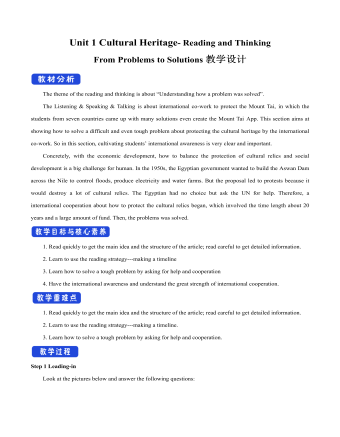
新人教版高中英语必修2Unit 1 Cultural Heritage-Reading and Thinking教案一
The theme of the reading and thinking is about “Understanding how a problem was solved”.The Listening & Speaking & Talking is about international co-work to protect the Mount Tai, in which the students from seven countries came up with many solutions even create the Mount Tai App. This section aims at showing how to solve a difficult and even tough problem about protecting the cultural heritage by the international co-work. So in this section, cultivating students’ international awareness is very clear and important. Concretely, with the economic development, how to balance the protection of cultural relics and social development is a big challenge for human. In the 1950s, the Egyptian government wanted to build the Aswan Dam across the Nile to control floods, produce electricity and water farms. But the proposal led to protests because it would destroy a lot of cultural relics. The Egyptian had no choice but ask the UN for help. Therefore, a international cooperation about how to protect the cultural relics began, which involved the time length about 20 years and a large amount of fund. Then, the problems was solved. 1. Read quickly to get the main idea and the structure of the article; read careful to get detailed information.2. Learn to use the reading strategy---making a timeline3. Learn how to solve a tough problem by asking for help and cooperation4. Have the international awareness and understand the great strength of international cooperation.1. Read quickly to get the main idea and the structure of the article; read careful to get detailed information.2. Learn to use the reading strategy---making a timeline.3. Learn how to solve a tough problem by asking for help and cooperation.

新人教版高中英语必修2Unit 3 The Internet-Discovering Useful Structure教案二
This teaching period mainly deals with grammar “The Present Perfect Passive Voice.” To begin with, teachers should lead students to revise what they have learned about the Present Perfect Passive Voice. And then, teachers move on to stress more special cases concerning this grammar。This period carries considerable significance to the cultivation of students’ writing competence and lays a solid foundation for the basic appreciation of language beauty. The teacher is expected to enable students to master this period thoroughly and consolidate the knowledge by doing some exercises. 1. Guide students to review the basic usages of the Present Perfect Passive Voice2. Lead students to learn to use some special cases concerning the Present Perfect Passive Voice flexibly.2. Enable students to use the basic phrases structures flexibly.3. Strengthen students’ great interest in grammar learning.1. Help students to appreciate the function of the Present Perfect Passive Voice in a sentence2. Instruct students to write essays using the proper the Present Perfect Passive Voice.观察下列句子特点,总结共同点。1.(教材P28)Much has been written about the wonders of the World Wide Web.2.(教材P28)But the Internet has done much more for people than simply make life more convenient.3.(教材P28)Many people have been helped by the club.4.(教材P28)She no longer feels lonely, and her company has become quite successful.5.(教材P32)Today I thought I’d blog about a question that has been asked many times—how do you stay safe online and avoid bad experiences on the Internet?

新人教版高中英语必修2Unit 3 The Internet-Listening &Speaking&Talking教案二
From the pictures in the text and the title--- choose the best app, we can know that this part is about how to save money by using apps.Step 2 While-listening1. Laura and Xiao Bo are talking about apps. Listen to their conversation and find out what apps they want.Xiao Bo is looking for a(n) exercise app to help him get in shape.Laura would like an app for getting rich and another that will make her grades better.2. Listen again. Are the sentences true T or false F?1). Both of Xiao Bo's apps keep track of the steps he takes._____2). Xiao Bo's second app can help him make a fitness plan._____3). Laura needs an app that will help her get discounts.______4). Laura needs an app that will add money to her bank account._______F T F T3. Listen once more and tick the sentence you hear. Underline the words used to express predictions, guesses, and beliefs.Predictions, Guesses, and Beliefs________It might help me walk more.________My guess is that it wouldn't work.________I imagine this app would help me get fit faster________I suppose that would be good.________I guess you could save a little with this app.________I suppose there would be some problems, too.________I believe this app could help me get thinner.

新人教版高中英语必修2Unit 4 History and Traditions-Discovering Useful Structure教案一
Step 5 Practice一、完成下列句子。1. Judy and I _______________(把车停下来(park))in an underground car Park near Trafalgar Square, where we could ______________________(让我们的车充电(charge)).2. When we finally reached the service desk to ask for audio guides, we heard it ___________ that there were no audio guides____________(留下,剩下).3. We__________________________(发现自己对...很惊讶)the large number of visitors and the amount of noise at the entrance of the National Gallery.4. Judy ____________________(眼神专注于) Van Gogh’s Sunflowers. It was hard to approach the painting as there were so many people around.5. She ____________________(把这幅画的复制品装箱(box)) to ensure that it was delivered safely.答案:1.had our car parked get our car battery charged 2. announced left 3. found ourselves very surprised 4. had her eyes fixed on 5. had a copy of the painting boxed二、用过去分词对下列句子进行改写。1. Loch Ness was surrounded by beautiful natural landscape, which made it look amazing.2. Carl and his friend stayed with a generous family who offered them bread with butter and honey that was homemade.3. The family’s ancestors once attended to soldiers who were wounded in the First World War.4. The young people were attracted by the legend of Loch Ness. They watched over the lake with their cameras and binoculars, which were positioned on the hill.答案:1. Loch Ness surrounded by beautiful natural landscape looks amazing.2. Carl and his friends stayed with a generous family who offered them homemade bread with butter and honey.3. The family’s ancestors once attended to wounded soldiers in the First World War.4. The young people attracted by the legend of Loch Ness watched over the lake with their cameras and binoculars positioned on the hill.

新人教版高中英语必修2Unit 4 History and Traditions-Listening&Speaking&Talking教案一
This unit is about history and traditions. From the opening page, we can know that this unit will introduce the history and traditions around the world. As Marcus Garvey says “A people without the knowledge of their past history, origin and culture is like a tree without roots”, it is important for students to realize the importance and value of knowing the history and traditions and their further meanings. And this part ( listening and speaking ) is divided into two parts: Part A---share views on historic sites, Part B ---talk about a visit to a historic tourist destination. By talking with a foreigner, the speakers introduce the historic attractions and their cultures. Part A is that William, a British student, who was going to visit the Confucius Temple and a Chinese student, Xiao Kong, who was going to the Confucius Temple to meet with the members of the research group, went together and exchanged their views on the Confucius Temple, Confucius, Confucius' descendants and Confucius' educational thoughts. Part B is a conversation between Xiao Yan, a youth hostel receptionist and Paul, a backpacker about the feelings and experience after visiting the Chinese famous tourist attraction Pingyao.1. Guide students to understand the content of listening texts in terms of the whole and key details; 2. Cultivate students' ability to guess the meaning of words in listening; discuss with their peers how to talk about historic spots and great person.3. Instruct students to use functional sentences of showing one’s excitement, surprise and disappointment.1. Guide students to understand the content of listening texts in terms of the whole and key details; 2. Cultivate students' ability to discuss with their peers the related topics.3. Enable students to use the functional items of showing one’s excitement, surprise and disappointment.

新人教版高中英语必修2Unit 4 History and Traditions-Discovering Useful Structure教案二
This teaching period mainly deals with grammar: The past participle is used as attributive and objective complement.1. Guide students to review the basic usages of the past participle used as attributive and objective complement.2. Lead students to learn to use some special cases concerning the past participle used as attributive and objective complement flexibly.3. Strengthen students’ great interest in grammar learning.1. Help students to appreciate the function of the past participle used as attributive and objective complement.2. Instruct students to write essays using the past participle used as attributive and objective complement.Step1:温故而知新。Analyze the underlined phrases and then sum up the common usages of the past participles.1.(教材P41)They had castles built(build) all around England, and made changes to the legal system.2.(教材P42)They use the same flag, known(know) as the Union Jack,...3.(教材P42)Judy and I had our car parked(park) in an underground car park near Trafalgar Square, where we could get our car battery charged(charge).Common points: f the past participle used as attributive and objective complement.Step 2:过去分词作定语时的意义1.及物动词的过去分词作定语,在语态上表示被动;在时间上,常表示动作已经发生或完成,有时也不表示时间性。Our teacher watched us doing the experiment and gave us a satisfied smile at last.我们的老师看着我们做实验,最后给了我们一个满意的微笑。The plan put forward at the meeting will be carried out soon.会上提出的计划将很快被执行。2.不及物动词的过去分词作定语,它不表示被动意义,只强调动作完成。Many little kids like gathering fallen leaves in the yard.

新人教版高中英语必修2Unit 4 History and Traditions-Listening&Speaking&Talking教案二
Listening and Speaking introduces the topic of “Take part in a youth project”. The listening text is an interview about "sharing views on historical sites". Through listening to a dialogue between Chinese and foreign students on the way to the Confucius Temple, students can understand their views on the Confucius Temple, Confucius, Confucius' descendants and Confucius' educational thoughts, so as to realize and think about the profound influence of Confucius and his thoughts on Chinese historical tradition. At the same time, the dialogue naturally integrates English idioms and mentions Shakespeare, the British playwright, so as to provide language materials and context for students to understand English idioms and related cultural allusions, as well as to compare Chinese and foreign cultures, which is helpful for students to understand and express the language such as history, tradition, culture and custom significant impact.Text analysis: listening text is a dialogue between a British student and a Chinese student when he goes to the Confucius Temple. When William, a British student, visited the Confucius Temple, he asked Xiao Kong, a Chinese student, for directions. Xiao Kong was just going to the Confucius Temple to meet with the members of the research group, so they went together and exchanged their views on the Confucius Temple, Confucius, Confucius' descendants and Confucius' educational thoughts. From the perspective of foreign tourists, this paper describes their thoughts on Confucius, the great son of Confucius, who had a profound impact on Chinese history and cultural tradition, and his education.Listening and Talking introduces a visit to a historic tourist destination. Tourism is a common way to understand a country's history, culture, and customs and so on. Students listen to the dialogue between Xiao Yan, a youth hostel Usher, and Paul, a backpacker, to learn about Pingyao's famous historical and cultural attractions and Paul's travel experience and experience as a foreign tourist.

新人教版高中英语必修2Unit 4 History and traditions教案
这个地区有着深厚的传统。既学既练:为了让更多的外国游客了解中国文化,欣赏中国美丽的自然风光,感受中国发生的巨大变化,某外文杂志社将出版一本英语小册子来介绍中国的旅游景点。该杂志社邀请你为该小册子写一篇英语短文来介绍杭州,内容包括:1.杭州的位置(中国东南部)、面积(16 000多平方公里)及历史(2 200多年)等;2.杭州的旅游特色(自然风景、传统文化、特色小吃等);3.希望更多的游客来杭州参观。注意:1.词数80左右;2.可适当增加细节,以使行文连贯。Located in the southeast of China, Hangzhou is a beautiful city.Dating back more than 2,200 years, Hangzhou covers an area of more than 16,000 square kilometers.In Hangzhou, you can visit the West Lake, whose scenery is fascinating.In addition, you can’t miss its cultural relics and historical sites, from which you will learn more about excellent Chinese traditional culture and traditions.In Hangzhou, the special snacks are famous and visitors from different parts of the world think highly of them.As a tourist attraction, Hangzhou attracts a large number of visitors from home and abroad every year.Once you come to China, Hangzhou is a scenic spot you can’t miss.

新人教版高中英语必修2Unit 5 Music-Listening&Speaking&Talking教案
choir memberspeople to run food stands people to sell festival ticketspeople to sell music CDspeople to set up equipmentmusical performersStep 2: Listen to the announcement again and answer the questions. ? 1. What kind of songs will Grace Davis sing at the festival?? 2. Who can try out as a performer?? 3. What can those who think they do not have musical talent do?? 4. How can students volunteer to take part?? Talking about preferences:? Would you prefer doing ..?? What would you prefer to do?? Would you rather do .... or ….?? What would you rather do?? I'd prefer .... to ..? I'd rather have ... than .. Step 3: Speaking ProjectWork in groups. Role-play the conversation or make a new one.? Debbie: Where have you been? You missed the announcement about the music festival.? John: I was at the doctor's office. Music festival?? Frank: Yes, it's going to be next month on the school sports field. John, you can play the piano. How about playing it at the festival?? John: Well, I'd rather play the violin. I can play Liang Zhu.? Frank: Wow! Sounds good. What about you, Debbie? ? Debbie: Actually, I don't have much musical ability. I'd prefer just to help out with the crowds.? Frank: You can sell tickets or work at a food stand.? John: So can I assume that the aim of the festival is to raise money?? Debbie: Yes. All of the money will go to charity.

新人教版高中英语必修2Unit 5 Music-Reading and Thinking教案二
1. Get basic information about Eric; read deeply to understand the history and development of the virtual choir.2. Understand what the function of the virtual choir is and how to make a virtual choir.3. Understand the meaning of some languages in the context of the text through question guidance, such as “Many people do not have close friends or contacts who have the same interest in music.” and so on.Step 1 Leading-in1. Answer the following questions.Q1:Do you know the Apps like Tik Tok and Quick Hand?Q2: Do you want to make a Tik Tok video or a Quick Hand video?2. Play a Tik Tok video Step 2: Understanding the title Q1:What does the title mean ?Q2: Is the article a narration or exposition? Why? Q3: Can you change the title ? If you can, what is the title?Step 3: Scanning the whole text and getting the basic information1. Answer the following questions.Q1:Who came up with the idea for a virtual choir?Q2: Where did Eric studied the musical composition?Q3: What is his song?2. Find the main idea of each paragraph3. Deal with some new words.Step 4: Reading carefully to get detailed informationPara 1 How to make a virtual choir1. PreparationA. tools: a virtual camera; an Internet connectionB. hero/heroin: friends or some individuals who have the same interests2. Process

新人教版高中英语必修2Unit 5 Music-Reading for Writing教案二
The Internet celebrity Gao Yifeng. Years ago, he owned 5 companies and the staffs over 1,000, but during the economy crisis, he became nothing but debt. He was so worried that his hair became white overnight. There was a time when he wanted to killed himself. But after listening to the song Start Over by Liu Huan, he decided to cheer himself up. He started a steamed bun shop and gradually became a national chain shops. Now he became successful again.Walter Haddon said, “Music is the medicine of a troubled mind.” Music contains such a pleasant and inspiring force. Music gave him courage and bravery. When he listened to the song, it made his spirit fly like a kite in the wind. Music gave him strength and brought him relief. It was the rock I leant on to become strong and to get through those hard times. I hope none of us have to go through the same kind of suffering that he did. At the same time, we all go through various periods when we feel sad or alone. During those times, music can help us in the same way that it helped him. I hope we all will somehow begin to treasure music and make it a part of our life. Thank you for your listening !5.Revise your writing each other.Does he/she explain how music has changed his/her/someone else’s life?Are some of the rhetorical devices included and used properly ?Does he/she talk about how music makes him/her/someone feel?Is the first word in each sentences capitalised?Does he/she use correct punctuation ?

人教版高中地理必修2城市内部空间结构教案
过渡:在实际生活中,城市内部空间结构并非完全按照这一经济规律呈现,而是更具复杂性。这说明除了经济因素外,还有很多其他因素在起作用,请大家结合你的认识、图2.9和案例1:纽约市的少数民族区谈谈你的看法。(2)其他因素I收入——形成不同级别住宅区的常见原因。有能力支付昂贵租金和选择最佳居住环境的人,其居住地往往形成高级住宅区。II知名度——城市内某些地区在历史、文化或经济方面具有很高的声誉,这往往会吸引更多新的住宅或商场建在该处,以提高其知名度。III种族聚居区的形成——在有些城市的某一区域内,如果某个种族或宗教团体占优势,就可能形成种族聚居区。如纽约市的唐人街、哈林区、小意大利区等。IV历史因素——城市的建筑物和街道设计可以维持久远,早期的土地利用方式对日后的功能分区有着深远的影响。
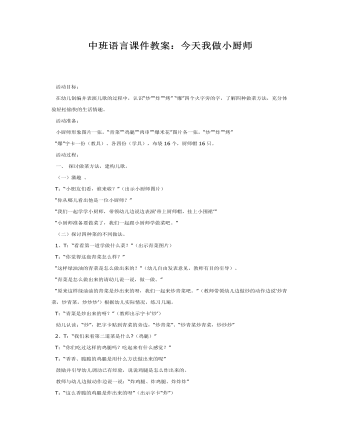
中班语言课件教案:今天我做小厨师
活动准备: 小厨师形象图片一张,“青菜”“鸡腿”“肉串”“爆米花”图片各一张,“炒”“炸”“烤” “爆”字卡一份(教具)、各四份(学具),布袋16个,厨师帽16只。 活动过程: 一、探讨做菜方法,建构儿歌。 (一)激趣。 T:“小朋友们看,谁来啦?”(出示小厨师图片) “你从哪儿看出他是一位小厨师?” “我们一起学学小厨师,带领幼儿边说边表演‘带上厨师帽,挂上小围裙’” “小厨师准备要做菜了,我们一起跟小厨师学做菜吧。” (二)探讨四种菜的不同做法。 1、T:“看看第一道学做什么菜?”(出示青菜图片) T:“你觉得这盘青菜怎么样?” “这样绿油油的青菜是怎么做出来的?”(幼儿自由发表意见,教师有目的引导)。 “青菜是怎么做出来的请幼儿说一说,做一做。” “原来这样绿油油的青菜是炒出来的呀,我们一起来炒青菜吧。”(教师带领幼儿边做炒的动作边说‘炒青菜,炒青菜,炒炒炒’)根据幼儿实际情况,练习几遍。 T:“青菜是炒出来的呀?”(教师出示字卡‘炒’) 幼儿认读:“炒”,把字卡贴到青菜的旁边,“炒青菜”、“炒青菜炒青菜,炒炒炒” 2、T:“我们来看第二道菜是什么?(鸡腿)” T:“你们吃过这样的鸡腿吗?吃起来有什么感觉?”
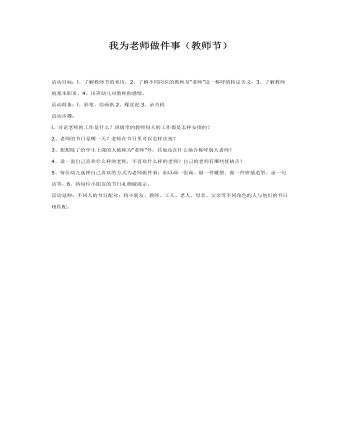
中班社会:我为老师做件事课件教案
2、了解不同岗位的教师及“老师”这一称呼的特定含义。3、了解教师的基本职责。4、培养幼儿对教师的感情。活动准备:l、彩笔、绘画纸2、橡皮泥3、录音机活动步骤:l、讨论老师的工作是什么?班级里的教师每天的工作都是怎样安排的?2、老师的节日是哪一天?老师在节日里可以怎样庆祝?3、想想除了给学生上课的人被称为“老师”外,其他还在什么场合称呼别人老师?
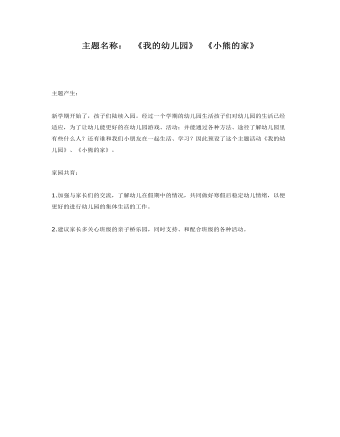
中班主题课件教案:2月份主题活动
主题产生:新学期开始了,孩子们陆续入园。经过一个学期的幼儿园生活孩子们对幼儿园的生活已经适应,为了让幼儿能更好的在幼儿园游戏、活动;并能通过各种方法、途径了解幼儿园里有些什么人?还有谁和我们小朋友在一起生活、学习?因此预设了这个主题活动《我的幼儿园》、《小熊的家》。
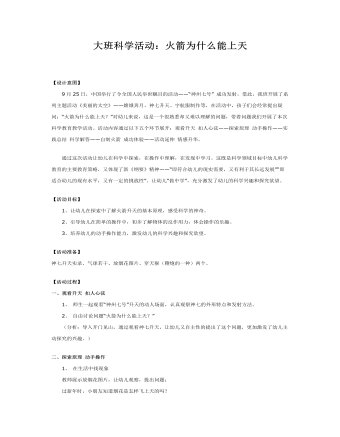
大班科学活动课件教案:火箭为什么能上天
【活动目标】1、让幼儿在探索中了解火箭升天的基本原理,感受科学的神奇。2、引导幼儿在简单的操作中,初步了解物体的反作用力,体会操作的乐趣。3、培养幼儿的动手操作能力,激发幼儿的科学兴趣和探究欲望。【活动准备】神七升天实录、气球若干、放烟花图片、穿天猴(鞭炮的一种)两个。【活动过程】 一、观看升天扣人心弦1、师生一起观看“神州七号”升天的动人场面,认真观察神七的外形特点和发射方法。2、自由讨论问题“火箭为什么能上天?” (分析:导入开门见山,通过观看神七升天,让幼儿又自主性的提出了这个问题,更加激发了幼儿主动探究的兴趣。)二、探索原理动手操作1、在生活中找现象 教师展示放烟花图片,让幼儿观察,提出问题: 过新年时,小朋友知道烟花是怎样飞上天的吗? 教师户外燃放穿天猴,请幼儿观察穿天猴升天现象。 一起说一说:“此现象和火箭升天有什么相似的地方吗?”2、在操作中找答案 给幼儿每人一个气球,引导幼儿吹上气,把口捏紧朝下,然后快速松手,气球会发生什么现象?(气球会一边向后喷气,一边向天空飞去。) 师:“气球吹的大和气球吹的小,快速松手后,它们飞的一样高吗?”“当气球喷完气后会怎样呢?” (分析:选择幼儿生活感兴趣、常见的类似火箭升天的现象让幼儿观察,拉进了幼儿与科学的距离,让幼儿觉得科学并不遥远,非常亲切。操作气球飞天,简单易行,让幼儿看小现象,懂大道理。)
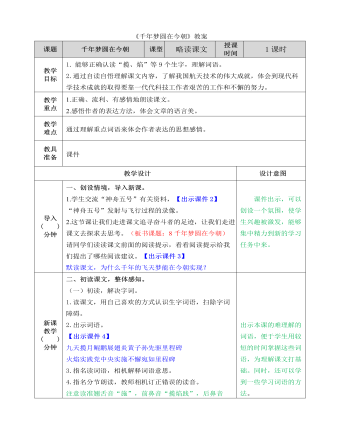
部编人教版四年级下册《 千年梦圆在今朝》教案
一、创设情境,导入新课。1.学生交流“神舟五号”有关资料,【出示课件2】“神舟五号”发射与飞行过程的录像。2.这节课让我们走进课文追寻奋斗者的足迹,让我们走进课文去探求去思考。(板书课题:8千年梦圆在今朝)请同学们读读课文前面的阅读提示,看看阅读提示给我们提出了哪些阅读建议。【出示课件3】默读课文,为什么千年的飞天梦能在今朝实现?二、初读课文,整体感知。(一)初读,解决字词。1.读课文,用自己喜欢的方式认识生字词语,扫除字词障碍。2.出示词语。
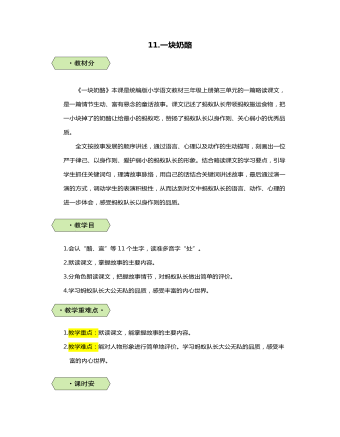
统编版三年级语文上一块奶酪教案
(1)板书“奶酪”,学生齐读。 (2)提问:二年级时,我们学过哪个关于奶酪的故事?(学生自由回答)(3)教师小结:是啊,在《狐狸分奶酪》这个故事里,为了从小熊兄弟的手里骗走美味的奶酪,狐狸可真是费尽心机哪!2.引导:今天我们要学的课文也讲到了奶酪,小蚂蚁想方设法搬奶酪,看来奶酪很诱人呢!奶酪的味道到底怎么样呢?我们一起来品味品味吧。(板书课题,学生跟读)3.设疑激趣(1)出示课文中的句子: ◇奶酪多诱人啊!抬着它,不要说吃,单是闻闻,都要淌口水。 ◇他低下头,嗅嗅那点儿奶酪渣,味道真香!
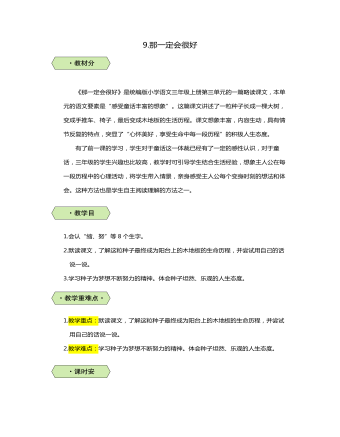
统编版三年级语文上那一定会很好教案
1.同学们,通过刚才的阅读,我们了解了主人公从一粒种子到木地板的变化历程,你觉得这粒种子不断地追求“很好”的过程,给你带来了怎样的启示?2.小组内交流,讨论课文蕴含的道理。3.教师点拨:这粒种子不断成长,渴望成材。成材之后,又在不同的阶段无私地奉献自己的才华和力量,实现了自我价值和社会价值的统一,是值得尊重的。4.学生说自己的体会。5.课文主旨探究。这是一篇优美动人的童话故事,写了一粒种子,怀揣梦想,努力生长,长成了一棵高大的树,在经历了变成手推车、椅子、木地板的过程中,告诉我们做人要像这棵树一样,有理想、有追求,并且为了实现自己的理想而努力奋斗的道理。
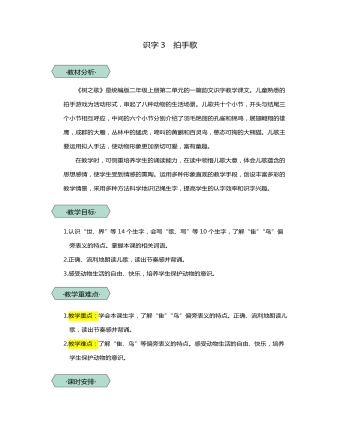
统编版二年级语文上识字3拍手歌教案
《树之歌》是统编版二年级上册第二单元的一篇韵文识字教学课文。儿童熟悉的拍手游戏为活动形式,串起了八种动物的生活场景。儿歌共十个小节,开头与结尾三个小节相互呼应,中间的六个小节分别介绍了羽毛艳丽的孔雀和锦鸡,展翅翱翔的雄鹰,成群的大雁,丛林中的猛虎,啼叫的黄鹂和百灵鸟,憨态可掬的大熊猫。儿歌主要运用拟人手法,使动物形象更加亲切可爱,富有童趣。在教学时,可侧重培养学生的诵读能力,在读中领悟儿歌大意,体会儿歌蕴含的思想感情,使学生受到情感的熏陶。运用多种形象直观的教学手段,创设丰富多彩的教学情景,采用多种方法科学地识记绳生字,提高学生的认字效率和识字兴趣。 1.认识“世、界”等14个生字,会写“歌、写”等10个生字,了解“隹”“鸟”偏旁表义的特点。掌握本课的相关词语。2.正确、流利地朗读儿歌,读出节奏感并背诵。3.感受动物生活的自由、快乐,培养学生保护动物的意识。 1.教学重点:学会本课生字,了解“隹”“鸟”偏旁表义的特点。正确、流利地朗读儿歌,读出节奏感并背诵。2.教学难点:了解“隹、鸟”等偏旁表义的特点。感受动物生活的自由、快乐,培养学生保护动物的意识。 2课时

